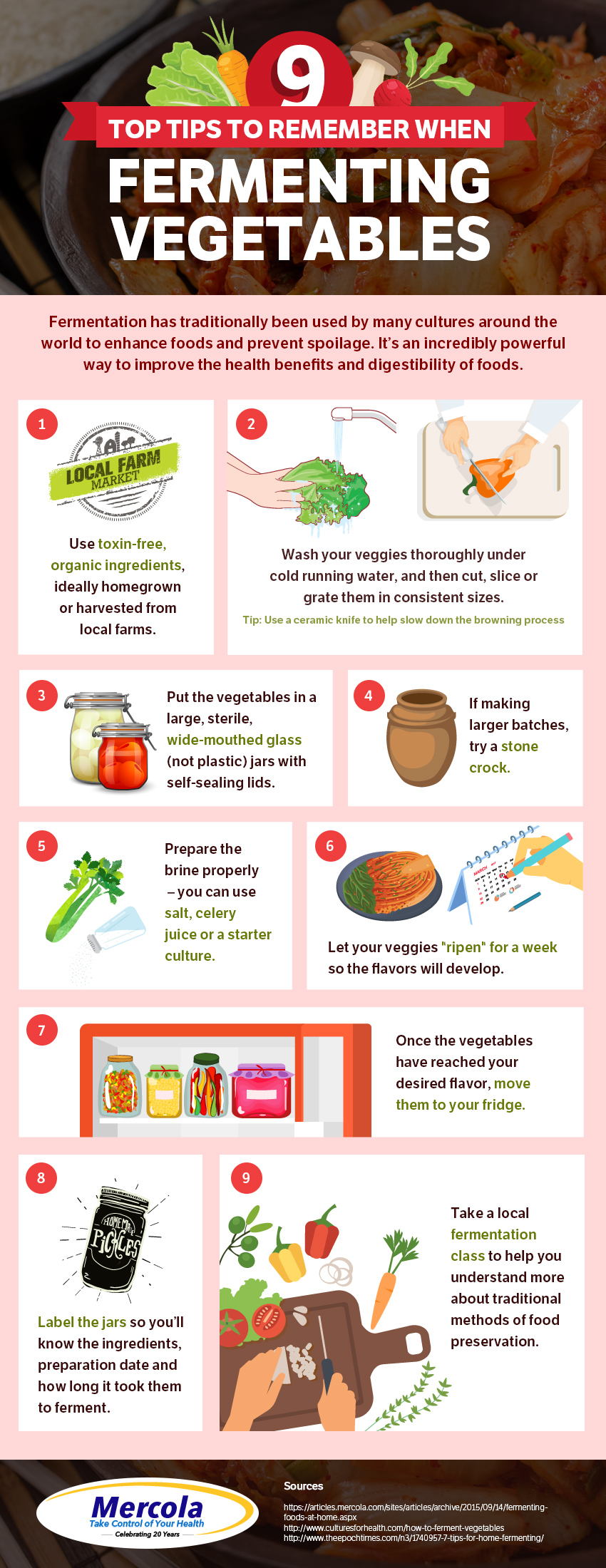Story at-a-glance -
- Fermentation is a process that’s been long-practiced by many cultures around the world
- One of the best strategies to ensure that you have optimal good bacteria levels in your body is to consume fermented foods
Fermentation has traditionally been used by many cultures around the world to enhance foods and prevent spoilage. It’s an incredibly powerful way to improve the health benefits and digestibility of foods.

The human body is actually a conglomerate of a diverse array of symbiotic microorganisms – it’s said that there are about 1,000 different bacteria species inside you, outnumbering your cells by 10 to 1. These bacteria all play a role in your well-being, which is why they need to be kept in the right ratio to ensure optimal physical and psychological functioning.
One of the best strategies to ensure that you have optimal good bacteria levels in your body is to consume fermented foods. Remember that 80 percent of your immune system is in your gut, so inoculating it with beneficial bacteria can set you on the right path towards longevity and good health.
And while you can easily buy high-quality fermented foods, such as fermented vegetables and cultured dairy, from reputable sources, it’s still recommended to make them at home for three reasons:
- You know that they were prepared properly
- You know exactly what’s in them
- You can customize your recipe to include ingredients you like
There’s no doubt that fermenting foods is a powerful health strategy. But how exactly does this process work, and what do you need to do to ensure you reap the benefits?
What’s the Big Deal About Fermentation?
Fermentation is a process that’s been long-practiced by many cultures around the world. During the early times, people ferment foods to prolong their shelf-life, to ensure that they have a bountiful supply when the cold winter arrives.
But that benefit only comes second – the major boon of this practice is that it boosts the nutritional content of foods. Not only does traditional fermentation make nutrients more bioavailable, but it also provides instant energy and produces:
|
Gut health-promoting beneficial bacteria. Fermented dairy products also have non-digestible carbohydrate galacto-oligosaccharide, which acts as a prebiotic, along with essential amino acids1,2
|
Increased bioavailability of minerals3 |
|
Beneficial enzymes
|
Certain nutrients, including B vitamins, biotin and folic acid4
|
|
Higher amounts of conjugated linoleic acid (CLA), particularly in fermented dairy5
|
Short-chain fatty acids, which help improve your immune system function
|
Traditional fermentation (if a specific starter culture is used) also produces vitamin K2 as a natural byproduct. This vitamin not only works with vitamin D to prevent losing the benefits of oral supplements, but is also believed to play a role in preventing arterial plaque buildup and heart disease.
The Health Benefits of Fermented Foods Are Astounding
There’s sufficient research confirming how fermented foods bring a wide range of positive effects on the human body, such as:
|
Enhancing Immune function
|
Restoring normal gut flora when taking antibiotics |
Reduced risk of infection from pathogenic microorganisms |
|
Potential anti-obesity and weight loss aid, as seen in animal studies
|
Preventing allergies in children6
|
Digestive benefits, such as reduced constipation and diarrhea |
|
Improving inflammatory bowel conditions, like ulcerative colitis, Crohn's disease, necrotizing enterocolitis and irritable bowel syndrome (IBS)
|
Easing symptoms of lactose intolerance |
Has antioxidant and detoxifying effects7
|
|
Reducing risk for Helicobacter pylori (H. pylori) bacterial infection, as well as urinary and female genital tract infections
|
Improving leaky gut
|
Easing premenstrual syndrome`
|
|
Lowering risk for Types 1 and 2 diabetes8
|
Improving mental health, mood and behavior
|
Reducing risk of brain disease, as well as Alzheimer’s
|
Try DIY Fermentation Today!
As the importance of optimal gut health becomes common knowledge, the demand for cultured foods has rapidly risen. Consumers are now seeking ready-made kimchi, sauerkraut and pickles from supermarkets, and probiotics are now being added to supplements, drinks and other products – although the potency of the probiotics in these products may be questionable.
The good news is that many consumers are now becoming wiser about these “probiotic products,” and are instead seeking to prepare their own fermented vegetables at home. This approach is not only more cost-effective, but it’s also healthier – for example, just a few ounces of homemade kimchi can carry as many beneficial bacteria as an entire bottle of probiotic supplements.
Making your own fermented vegetables at home isn’t a difficult task, but it does require a time commitment. However, once you’ve gotten the basics down, the preparation time will eventually become quicker and you will be rewarded with a great-tasting, high-quality, probiotic-loaded product.
One Final Reminder When Eating Fermented Foods
If you’ve never had fermented foods before, it’s best to take it slowly and only eat small portions. Too much can prompt a healing crisis, which occurs when the pathogens in your gut die and release potent toxins. Start with a teaspoon at first and observe your reactions before proceeding with another portion.
Once you can tolerate the probiotics, you can increase the serving size to a quarter or one-half cup of fermented vegetables, eaten along with one to three meals per day. This is all you need to reap the health benefits of these extraordinary foods.
Click Here to Learn More About the Benefits of Fermentation